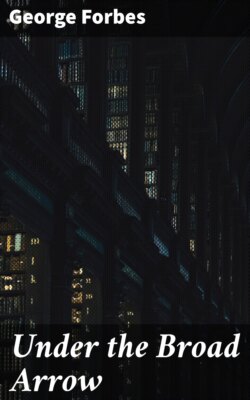Читать книгу Under the Broad Arrow - George Forbes - Страница 6
На сайте Литреса книга снята с продажи.
CHAPTER III.—CONSTABLE FITCH.
ОглавлениеTable of Contents
A GOVERNMENT billet, although a minor one, was a great improvement upon the conditions of a transported felon, and Constable Fitch might have even then retrieved his character. But Constable Fitch was not ambitious for reform.
A constable among the miserable convicts wielded almost unlimited power, and Fitch soon proved himself to be an inhuman monster in his treatment of the half-starved and manacled wretches whom he had in charge.
For the crime of being found with tobacco in their possession the penalty for these tortured criminals was a flogging of from fifty to a hundred lashes, and Constable Fitch earned for himself a reputation for smartness by secreting small pieces of this forbidden luxury about the persons of the convicts, which he would subsequently discover on searching them, and make the subject of a report upon which to have them flogged.
For this treachery to his fellow-criminals, although it must have been guessed at by those in authority, he was highly commended, and he won for himself the reputation for being a vigilant and painstaking officer.
At length, having become tired of country life, and being anxious for a spell in town, he, one day in 1829, made his way to Parramatta, where he called at a public-house and ordered a pint of rum, which he drank, as the landlord subsequently stated, "like a gentleman"; after which he interviewed his host with regard to a little business transaction.
Representing himself to be an overseer at an up-country sheep station, with some teams on their way to Sydney, he asked him to discount a pro-note for eight pounds, drawn by one James Hale, of the White Hart Hotel, at Windsor, in favor of a third person.
After some little demur the note was cashed, three pounds being deducted as a modest commission, and, with the remaining five pounds in his pocket, Constable Fitch went on his way to Sydney by the next coach.
When the note was presented to Hale, it was declared to be a forgery, and information was accordingly given to the police.
Fitch, however, was not caught for some months afterwards, when he was brought to trial before Chief Justice Forbes and a jury of seven military officers.
In his address to the jury, the prisoner pleaded with much eloquence on his own behalf, and dwelt on the improbability of a man in his position placing himself in jeopardy for the sake of so trifling a sum, when he could show that he was in the habit of receiving money, not only from the Government, but also from his friends at Home, whom he referred to, with little regard for their feelings, as being "of the first respectability."
A merchant named Marr, whom he called as a witness, stated that he was in the habit of supplying the prisoner with goods "by order of a gentleman," to the amount of thirty pounds at a time. The orders were not for money, but for goods, and were usually given half-yearly. The gentleman who gave them told him, so he said, that these supplies were paid for, partly by the prisoner's family at Home and partly by himself, and he often said "that he would do anything to get the prisoner home to his friends," whom it may well be believed would not have thanked him for such a service.
The jury, some of the officers composing it no doubt being acquainted with the prisoner's family, returned a verdict of "Not Guilty," and the Chief Justice also addressed the prisoner in words which showed that he, too, was acquainted with the facts of his past life. Indeed, he had known him at Bermuda, when Fitch was a captain in His Majesty's Navy, and he, the Chief Justice, was Attorney-General of that colony.
"I exhort you," said the Chief Justice, "to forsake those evil courses which have led you into the dreadful situation in which you are now placed. Notwithstanding the verdict of the jury, at which I feel a great relief, I think that enough has come out this day to warrant me in thus admonishing you to adopt such a line of conduct in future as in time will make you worthy to claim some acquaintance with your former friends. In the course of your defence, you have made allusion to the respectability of your family. I myself can state that fact, and I may also say from personal knowledge that I have seen you in a situation very different from that in which you now are. I do not say this to wound your feelings, but rather that it should make an impression on your mind, and have a salutary effect upon your future conduct. I repeat that I am thankful that a verdict has redeemed you from the peril in which you were this day placed. Depart, and let this escape you have had operate as a salutary warning throughout the remainder of your life."
As will be seen, however, this kindly advice had but little effect upon the future career of John Fitch.
